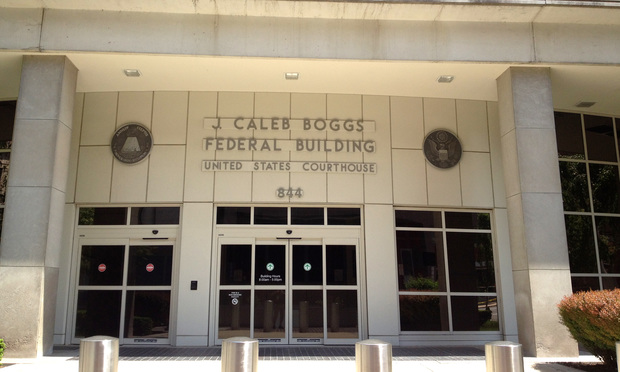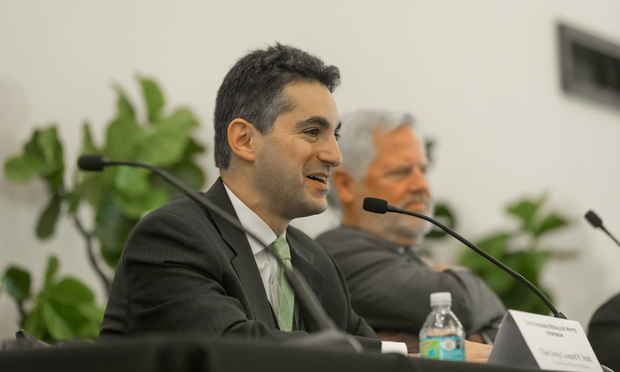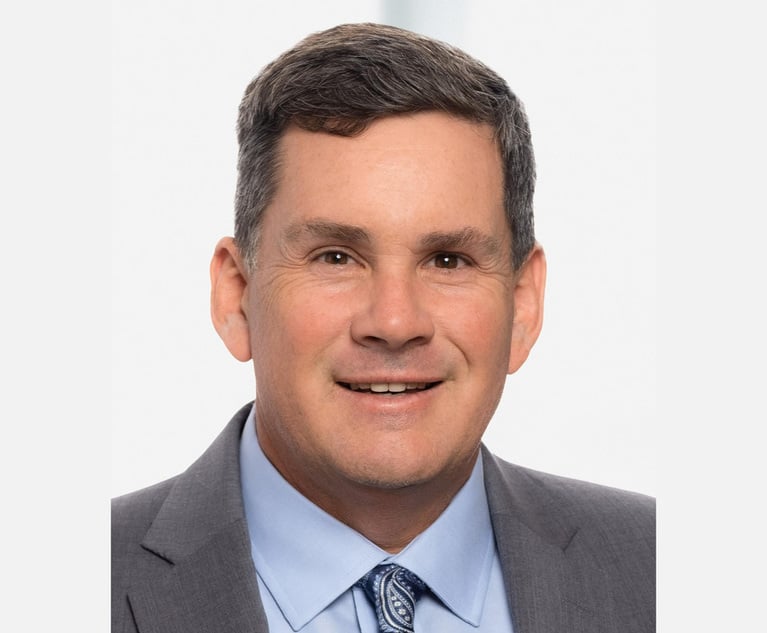District of Delaware Pushes Back Jury Trial Scheduled to Be Among First Since Shutdowns
A long-awaited intellectual property case involving the energy company Sunoco was one of the matters to be postponed indefinitely, as Chief Judge Leonard Stark said the continued bar on jury trials would be extended through the end of August as a safety precaution.
July 22, 2020 at 05:43 PM
6 minute read
The original version of this story was published on Delaware Law Weekly
 J. Caleb Boggs Federal Courthouse in Wilmington, DE. Photo: Diego M. Radzinschi/ALM
J. Caleb Boggs Federal Courthouse in Wilmington, DE. Photo: Diego M. Radzinschi/ALM
The U.S. District Court for the District of Delaware again postponed all jury trials last week, including what would have been one of the first to be held in person in the country since the COVID-19 pandemic limited court proceedings nationwide.
Sunoco Partners Marketing & Terminals LP's intellectual property case against energy companies Powder Springs Logistics LLC and Magellan Midstream Partners LP, which has been pending for almost three years, was scheduled to go to trial beginning Aug. 3, with a combination of in-person appearances and remote witnesses, but has been postponed indefinitely.
U.S. District Chief Judge Leonard P. Stark of the District of Delaware issued an order July 16 stating the decision to postpone federal jury trials in Delaware at least through the end of August was made as a safety precaution in an attempt to both minimize the large gatherings that jury selection would entail and cut down on travel for those involved in court matters.
 U.S. District Chief Judge Leonard Stark of the District of Delaware. Photo: Jason Doiy/ALM
U.S. District Chief Judge Leonard Stark of the District of Delaware. Photo: Jason Doiy/ALMIn a memorandum order issued at the beginning of the month, Stark outlined what were intended at the time to be precautions taken during the Sunoco trial, including having witnesses testify remotely and limiting the number of people permitted in the courtroom.
"This is something of an experiment," Stark wrote in the order, which concluded by noting the possibility of a continuance. "I expect I will follow different procedures in other cases and at different times and I strongly suspect my colleagues (in the District of Delaware and elsewhere) will do things differently than I plan to do at this trial. I am entering this order as the presiding judge in this specific case, not as chief judge of the district."
If the trial had gone forward, it would have been preceded by only a handful of in-person jury trials to have begun in the U.S. since court systems began determining individually how to address the pandemic. In April, during what may have been the first attempt at a jury trial since courts closed, jury selection for the trial of a man in Ohio ended abruptly when the defendant became short of breath and the trial was postponed.
Federal jury trials have only just begun in Texas, and New Jersey has resumed trials that were cut short months ago, though the state isn't currently beginning new jury trials. Similar to the District of Delaware, an order was issued over the weekend pushing back jury trials in Florida, which had planned to resume jury trial proceedings Monday.
"By what I can tell and what's been reported, they've all been running relatively smooth. They've not surprisingly had a couple technical issues," said Dan Wolfe, senior director of jury consulting for Magna Legal Services, of the trials that have taken place recently. "In terms of just getting people in and out and things of that nature, they seem to be going fairly well, by all accounts."
As is the case throughout most of the country, trials are also on hold in Delaware's state courts, with in-person jury trials not to take place until the Delaware Judiciary reaches Phase 3 of its four-phase reopening plan, though trials that don't require a jury have been underway. Currently, Delaware courts are under Phase 2 of the plan. On July 6, Chief Justice Collins J. Seitz Jr. extended the state's judicial emergency and said it's expected to stay in Phase 2 until Aug. 6 and likely longer.
Wolfe said, based on the trials that have proceeded so far, he's seen two predominant factors that seem to be key in a court system's ability to resume trials. First, he said, courts have ensured they have access to a space large enough to hold everyone needed for a trial while maintaining social distancing guidelines, whether that be a large courtroom or a location such as a gymnasium or theater.
Second, Wolfe said, the courts that have been able to successfully start jury trials have been those in judiciary systems with good communication. He said it's expected that people will be more likely to show up for jury duty if the court system has communicated to them the procedures in place for their safety beforehand.
"People have been fairly accommodating and understanding and appreciative that the court personnel have tried to work really hard to accommodate the jurors," Wolfe said. "Anecdotally, several people have reported everybody being 'more patient.'"
Magna recently surveyed 500 people nationwide in an attempt to gain insight on how prospective jurors' attitudes might have been impacted by COVID-19. While the results of the survey are still being analyzed, Wolfe said 60% of those surveyed said they would be less critical of those working in health care than they might have been prior to the pandemic, while more than 80% said they were concerned about the safety of health care workers who are dealing with the virus directly, and 23% said they, a family member or a close friend has been a first responder who has addressed COVID-19.
"Certainly, (in) cases like medical malpractice cases, it's that notion of a halo effect," Wolfe said. "We saw this post-9/11 for firefighters and law enforcement officials, this positive perception. So certainly, we're seeing that here."
Wolfe said Magna has also noted that during both mock jury trials and proceedings involving remote witnesses during actual trials, jurors reported approval of seeing people speak via video call, rather than in front of them in a courtroom.
"They actually report a more positive experience because they can see the witnesses more closely, whereas in a courtroom, they might be more distant and it might make it more difficult for them to judge facial expressions and the like," Wolfe said.
This content has been archived. It is available through our partners, LexisNexis® and Bloomberg Law.
To view this content, please continue to their sites.
Not a Lexis Subscriber?
Subscribe Now
Not a Bloomberg Law Subscriber?
Subscribe Now
NOT FOR REPRINT
© 2025 ALM Global, LLC, All Rights Reserved. Request academic re-use from www.copyright.com. All other uses, submit a request to [email protected]. For more information visit Asset & Logo Licensing.
You Might Like
View All

Labaton’s Eric Belfi on Running Case Investigation, Analysis and Delaware Presence

Chancery Stays Action Pending Resolution of a Motion to Dismiss in a First-Filed Action to Which the Defendant Is Not a Party
5 minute read
Chancery Court Exercises Discretion in Setting Bond in a Case Involving Share Transfer Restriction
6 minute readTrending Stories
- 1IP Firm Fish & Richardson To Open Chicago Office
- 2Late Fees on a Balloon Payment Due at Maturity
- 3Social Engineering Crimes Pose Significant Business Threats: Insurance Coverage Insights for Digital Fraud
- 4Five Years After Vega Much Remains Unsettled in Pay Frequency Litigation
- 5DLA Piper Hires Former FAA Chief Counsel as Transportation Practice Co-Chair
Who Got The Work
J. Brugh Lower of Gibbons has entered an appearance for industrial equipment supplier Devco Corporation in a pending trademark infringement lawsuit. The suit, accusing the defendant of selling knock-off Graco products, was filed Dec. 18 in New Jersey District Court by Rivkin Radler on behalf of Graco Inc. and Graco Minnesota. The case, assigned to U.S. District Judge Zahid N. Quraishi, is 3:24-cv-11294, Graco Inc. et al v. Devco Corporation.
Who Got The Work
Rebecca Maller-Stein and Kent A. Yalowitz of Arnold & Porter Kaye Scholer have entered their appearances for Hanaco Venture Capital and its executives, Lior Prosor and David Frankel, in a pending securities lawsuit. The action, filed on Dec. 24 in New York Southern District Court by Zell, Aron & Co. on behalf of Goldeneye Advisors, accuses the defendants of negligently and fraudulently managing the plaintiff's $1 million investment. The case, assigned to U.S. District Judge Vernon S. Broderick, is 1:24-cv-09918, Goldeneye Advisors, LLC v. Hanaco Venture Capital, Ltd. et al.
Who Got The Work
Attorneys from A&O Shearman has stepped in as defense counsel for Toronto-Dominion Bank and other defendants in a pending securities class action. The suit, filed Dec. 11 in New York Southern District Court by Bleichmar Fonti & Auld, accuses the defendants of concealing the bank's 'pervasive' deficiencies in regards to its compliance with the Bank Secrecy Act and the quality of its anti-money laundering controls. The case, assigned to U.S. District Judge Arun Subramanian, is 1:24-cv-09445, Gonzalez v. The Toronto-Dominion Bank et al.
Who Got The Work
Crown Castle International, a Pennsylvania company providing shared communications infrastructure, has turned to Luke D. Wolf of Gordon Rees Scully Mansukhani to fend off a pending breach-of-contract lawsuit. The court action, filed Nov. 25 in Michigan Eastern District Court by Hooper Hathaway PC on behalf of The Town Residences LLC, accuses Crown Castle of failing to transfer approximately $30,000 in utility payments from T-Mobile in breach of a roof-top lease and assignment agreement. The case, assigned to U.S. District Judge Susan K. Declercq, is 2:24-cv-13131, The Town Residences LLC v. T-Mobile US, Inc. et al.
Who Got The Work
Wilfred P. Coronato and Daniel M. Schwartz of McCarter & English have stepped in as defense counsel to Electrolux Home Products Inc. in a pending product liability lawsuit. The court action, filed Nov. 26 in New York Eastern District Court by Poulos Lopiccolo PC and Nagel Rice LLP on behalf of David Stern, alleges that the defendant's refrigerators’ drawers and shelving repeatedly break and fall apart within months after purchase. The case, assigned to U.S. District Judge Joan M. Azrack, is 2:24-cv-08204, Stern v. Electrolux Home Products, Inc.
Featured Firms
Law Offices of Gary Martin Hays & Associates, P.C.
(470) 294-1674
Law Offices of Mark E. Salomone
(857) 444-6468
Smith & Hassler
(713) 739-1250






